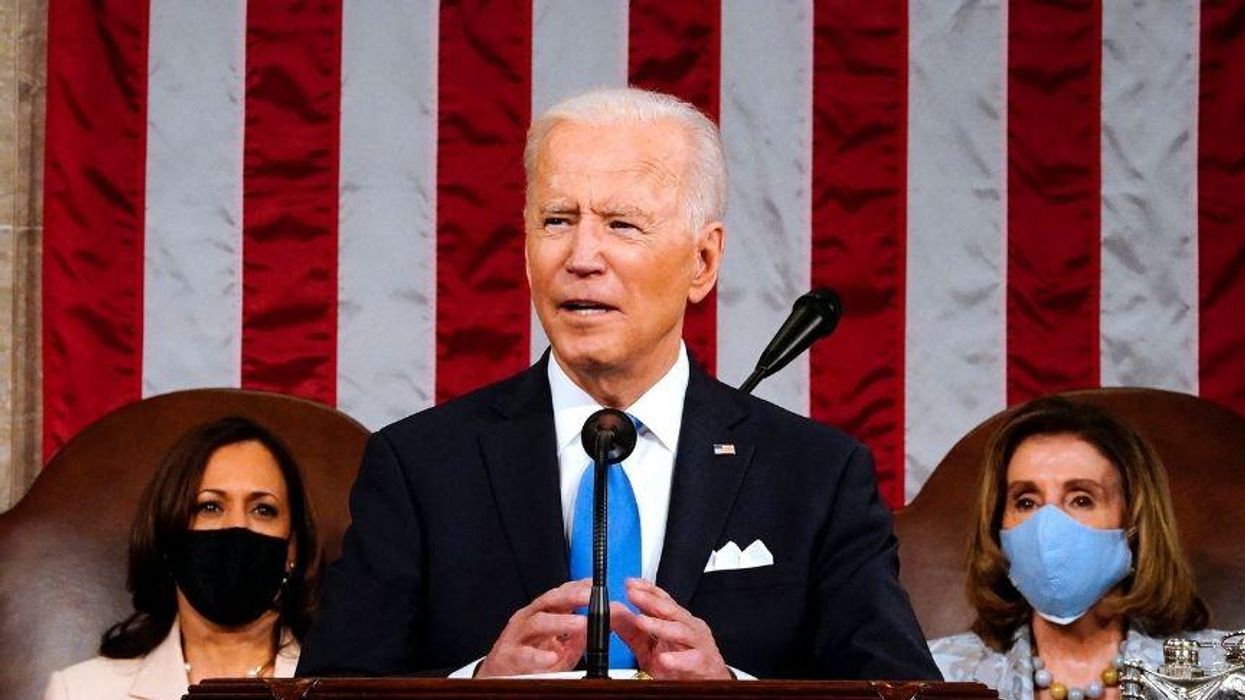The past few days have seen increased fissures within the GOP, while Democrats are celebrating some good news that could help them hold Congress this November. A recap of recent developments:
Mike Pence Finally Spoke Out against Trump on January 6
At a speech in Florida, former Vice President Mike Pence said that Trump was “wrong” that he had the power to alter the electoral outcome unilaterally. “I had no right to overturn the election,” Pence said to a group of conservatives gathered in Orlando, Florida.
Trump hit back quickly, blasting Pence for being on “an automatic conveyer belt” on January 6 “to get Biden elected President as quickly as possible”—even though the election had in fact long since been decided and Pence’s role by that point was merely ceremonial.
Critics pointed out that Pence should not be considered a hero for merely doing his constitutional duty, but given the unusual pressure on him leading up to that day and the threats to his life that ensued from the former president’s tweet on the afternoon of the 6th, which itself is being investigated as having contributed to or incited the violent attack on the Capitol, it would be wrong to dismiss his stance or his speech wholesale. Rather, it shows that in at least some quarters of the GOP, those with political ambitions of their own are beginning to stand up to Trump and risk incurring his wrath.
The GOP Censures Reps. Liz Cheney and Adam Kinzinger
On Friday the Republican Party also took the unusual step of voting overwhelmingly to censure the only two members of the party who are serving on the January 6 Committee. The censure drew widespread attention because of its wording, which labeled the January 6 attack and the events leading up to it “legitimate political discourse” and accused the Committee of targeting innocent citizens as part of its investigation. (GOP leaders sought later to clarify that they did not mean to imply that the violent assaults that day were in any way legitimate political discourse, but the text of the resolution itself made no such distinction.)
More traditional conservatives, such as Senators Mitt Romney and Lisa Murkowski, condemned the resolution and stood beside Cheney’s and Kinzinger’s work. Murkowski told CNN the censure was “absolutely wrong” and added, “It is my responsibility as an Alaskan senator speaking out for Alaskans to just speak the truth.”
Americans overwhelmingly support the work of Congress in continuing to investigate January 6 and the events leading up to it, with 7 in 10 supporting the Committee’s work and 57 percent saying the former president deserves a great deal or quite a bit of blame for the attack on the Capitol, according to a January 2022 poll by AP and the University of Chicago. This is up from where the number stood at the end of January 2021, according to the same poll, implying that as more facts become known, American public opinion is shifting. This trend could in part explain the perceived need for Republicans to rally the base around discrediting the two GOP members who serve on the Committee.
The Congressional Map Is Looking Better for Democrats
Going into redistricting, many Democrats feared the GOP would be able to leverage its dominance in state legislatures to redraw the 2020s map to their further advantage, with some predicting net gains of between 6 to 13 seats for the Republicans. But that simply hasn’t materialized. The current outlook, according to the Cook Political Report, is for a net gain of two or three likely Democratic seats. This follows key GOP court losses in North Carolina and Ohio, where maps have run afoul of state constitutions.
On top of that, Democratic-controlled legislatures in New York and Illinois, despite each state losing one seat due to reapportionment after the census, are hitting back against the GOP gerrymanders in other states with aggressive district drawings of their own, cutting down the number of likely Republican seats by a likely net four or five. Democrats generally have been willing to risk creating lean-blue districts, which might tip red in a wave year for Republicans, while Republicans have in general padded their incumbents’ chances by making their districts lean even heavier GOP.
The upshot is that Democrats will have a better map, on its face, than they had in 2018 and 2020 when they took and then held the House. This gives Democrats a glimmer of hope in 2022, when they are seeking to not lose their 5 seat majority, because at least structurally speaking, they are on firmer ground. It will be up to Democrats to turn out as they did before and hold the line.
Strong Economic News, Falling Covid Numbers and a Base-Rallying Opportunity on SCOTUS
Last week also delivered unexpectedly strong job numbers for the U.S. economy, with January’s 467,000 new jobs blowing well past expectations. November and December numbers were also revised significantly upward. According to Labor Secretary Marty Walsh, Biden ended his first year with a gain of 6.6 million new jobs, the most in history, with some 87 percent of jobs lost during the pandemic regained since he took office a year ago. The GOP had been hoping to hammer him on the state of the economy, but they are running short of talking points outside of inflation. Should gas and food prices begin to fall, a reassessment of Biden’s performance on the economy could lift his presently dismal poll numbers currently beset by high inflation.
Adding to a sense of optimism are reports that new Covid-19 cases and hospitalizations are falling dramatically in many parts of the country, with some states like New Jersey and Delaware even announcing that school mask mandates will lift in March. If the Omicron variant subsides in intensity as expected and no new, more dangerous variants emerge, a nation returning to some semblance of normalcy could also strongly affect the Democrats’ political chances and vindicate Biden’s pandemic policies, including widespread availability of vaccines, home testing kits and N-95 masks.
Finally, it appears that, despite Republican howls over Biden’s pledge to name a Black woman to the Supreme Court to replace retiring Justice Stephen Breyer, the push to do so has broad support among the Democratic base and is unifying Democrats on the Hill, who have had a tough time lately finding victories. A quick nomination and confirmation could energize key constituencies and show the majority can hold on at least some vitally important matters. “I think it will be a big plus with African American voters, and women and younger voters, there's no question about it,” said Bill Carrick, a Democratic political consultant from California. “Historically, Democrats have not focused as much on the court as Republicans, but in this circumstance, it's very different.”
What’s more, the confirmation process likely will conclude just as the January 6 Committee is gearing up for very public hearings later this spring, laying out what it has learned and leaving the GOP on the defensive as election season begins. In short, while things might presently look grim for the Democrats, 2022 is just getting started, and simply it’s too early to know where the mood of the nation will be by November.
For more political analysis, check out the Status Kuo newsletter.













 @obamaatredrobin/X
@obamaatredrobin/X
 @realDonaldTrump/Truth Social
@realDonaldTrump/Truth Social

 @.a.zan/TikTok
@.a.zan/TikTok @.a.zan/TikTok
@.a.zan/TikTok @.a.zan/TikTok
@.a.zan/TikTok @.a.zan/TikTok
@.a.zan/TikTok @.a.zan/TikTok
@.a.zan/TikTok @.a.zan/TikTok
@.a.zan/TikTok @.a.zan/TikTok
@.a.zan/TikTok @.a.zan/TikTok
@.a.zan/TikTok @.a.zan/TikTok
@.a.zan/TikTok @.a.zan/TikTok
@.a.zan/TikTok @.a.zan/TikTok
@.a.zan/TikTok @.a.zan/TikTok
@.a.zan/TikTok @.a.zan/TikTok
@.a.zan/TikTok @.a.zan/TikTok
@.a.zan/TikTok @.a.zan/TikTok
@.a.zan/TikTok